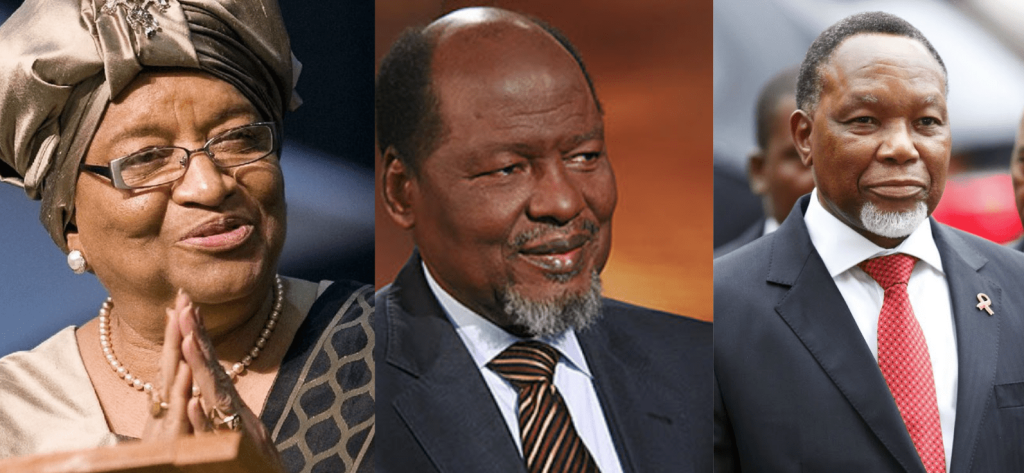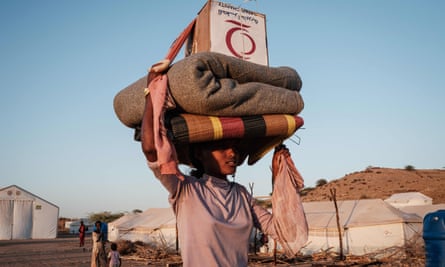You really couldn’t make it up. Terrorism…trouble in Mozambique…Western Sahara…but not a word about the war currently raging North of the African Union headquarters in Addis Ababa.
Not a mention of the three African Union presidents Ramaphosa asked to mediate in the Tigray conflict.

Any wonder the African Union is held in such low regard by ordinary Africans?
OPENING STATEMENT BY AFRICAN UNION CHAIRPERSON PRESIDENT RAMAPHOSA AT THE 14TH EXTRAORDINARY SESSION ON SILENCING THE GUNS
6 DECEMBER 2020
VIRTUAL PLATFORM
Your Majesties,
Your Excellencies, Heads of State and Government,
H.E. Moussa Faki Mahamat, Chairperson of the African Union Commission,
Honourable Ministers,
Commissioners of the African Union,
Representatives of Regional Economic Communities,
Ladies and Gentlemen,
Let me welcome you, once again, to this 14th Extraordinary Session on Silencing the Guns.
While the year 2020 has imposed unprecedented challenges on us, it has also reminded us of our fortitude and resilience as Africans.
We have gathered here today to assess the progress we have made since 2013 when we adopted the Agenda 2063 flagship project of ‘Silencing the Guns’ by 2020.
With this flagship project, we committed ourselves to the objective of creating a conflict-free continent that is stable, developed, prosperous and capable of delivering the better life that all its people yearn for.
We made a solemn declaration not to bequeath the burden of wars to the next and future generations of Africans.
It was at the January 2017 Assembly that we adopted the AU Master Roadmap of Practical Steps for Silencing the Guns in Africa by the Year 2020.
As we gather here, we all know that the guns are not yet silent.
In some areas peace has been achieved, but considerable challenges still confront us.
There are shortcomings in implementation that must be addressed urgently because they diminish our ability to consolidate peace, prevent the recurrence of violent conflict, build social cohesion, deepen democracy and advance economic development.
Peace and stability will remain elusive if we do not address the connection between security and development; these are mutually reinforcing and one cannot be achieved without the other.
Sustainable peace can only be achieved by building a just world and a rules-based international order that is inclusive and that addresses the root causes of conflict, such as poverty, injustice and discrimination.
We condemn the acts of violence, terrorism and violent extremism as seen in the Sahel region and that are now spreading to other parts of the Continent, including our sisterly country of Mozambique.
We equally express our grave concern about the current situation in Western Sahara, which demands that every effort is made to facilitate the self-determination of the people of Western Sahara.
We need to reaffirm our commitment to the full and successful implementation of the AU Master Roadmap of Practical Steps to Silence the Guns in Africa.
As we march towards the start of trading under the African Continental Free Trade Area on the 1st of January 2021, we are mindful that its success cannot be separated from a stable and conducive business environment that is able to attract foreign direct investment.
We need to address the root causes of conflict in our societies through a multifaceted approach that will require improved governance, entrenched democratic norms, respect for human rights and the political will to capacitate our institutions.
We need to address the continued exclusion of women in the economic, political and social spheres, which renders them particularly vulnerable to violence and conflict and which undermines the contribution they could make to finding and sustaining peace.
We welcome the ongoing efforts to create a conducive environment for the effective participation of women and youth in peace and development processes.
It is through political will that we will overcome.
It is through political will that we, the African Union, will foster unity among the people of our continent.
Yesterday we marked the 7th anniversary of the passing of the founding father of the South African nation, President Nelson Mandela.
As we continue to remember him and draw inspiration from his lifelong dedication to the African cause, it is fitting that we, who are given the privilege to lead our people, work practically to give meaning to his dream of “an Africa which is at peace with itself”.
Let us work to realise the dreams of our forebears and ensure that the next and future generations of Africans will reap the rewards of an Africa at peace with itself.
We look forward to your insights and perspectives on our agenda item of the day.
Equally, we look forward to the adoption of concrete decisions that will emanate from our engagements.
I therefore declare this session officially open and I wish us all fruitful deliberations.
I thank you.





 Eritrean refugees are pouring out of the UN camps in which they have been living, to escape being engulfed in the fighting in Tigray.
Eritrean refugees are pouring out of the UN camps in which they have been living, to escape being engulfed in the fighting in Tigray.




 h
h


















